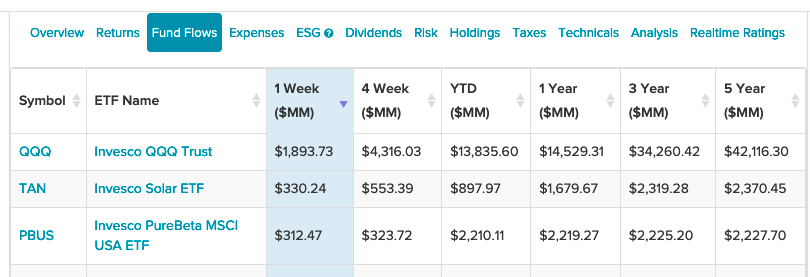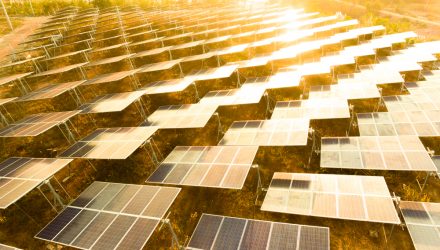The move towards renewable energy is seeing strong inflows into the Invesco Solar ETF (TAN) the past week, coming in as runner-up to the popular Invesco QQQ Trust.
The trillion-dollar infrastructure package up for debate in the House of Representatives will include incentives for renewable energy that feature a push for more solar energy usage. Additional government incentives will also help drive more adoption of solar panels in homes, which, as of now, mostly help households with higher incomes.
“The essential tax credit is designed to help residential customers install renewable energy systems such as solar, wind and geothermal, but without a direct pay option, the low- and moderate-income households who would benefit most from distributed generation are effectively blocked from accessing this tax credit,” wrote 25 senators in an Oct. 1, 2021 letter that proposes to modify the tax code.

In the meantime, TAN is up 37% year-to-date. The fund seeks to track the investment results of the MAC Global Solar Energy Index. Strictly in accordance with its guidelines and mandated procedures, MAC Indexing LLC compiles, maintains, and calculates the index, which is designed to track the global solar energy equity sector.
Landmark Move Towards Renewable Energy
Solar power usage is also growing at a global scale. United Arab Emirates oil giant Abu Dhabi National Oil Company (ADNOC) is planning to power its operations with solar and nuclear energy starting in 2022, which marks a landmark move by a major oil player.
“This landmark clean energy partnership with EWEC will make ADNOC the first major oil and gas company to decarbonize its power at scale,” said Sultan Al Jaber, managing director and group CEO of ADNOC.
According to a CNBC article, ADNOC signed a supply deal with the Emirates Water and Electricity Company (EWEC) to begin the move to solar and nuclear energy in January 2022.
“Several international oil companies have net zero commitments for operational emissions. This is quite groundbreaking in terms of realizing zero carbon electricity across an entire portfolio,” said Robin Mills, CEO of Qamar Energy, a UAE-based energy consultancy.
“My estimate is this could save about 7-9 Mt (million metric tons) CO2 emissions a year. Possibly more if applied to the downstream industries,” Mills said.
For more news, information, and strategy, visit the Innovative ETFs Channel.








